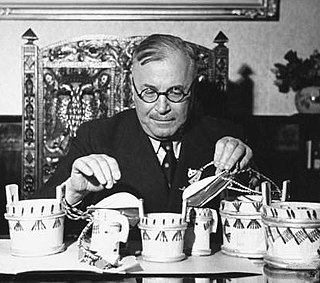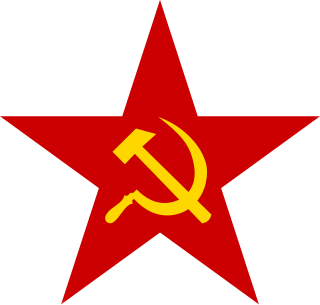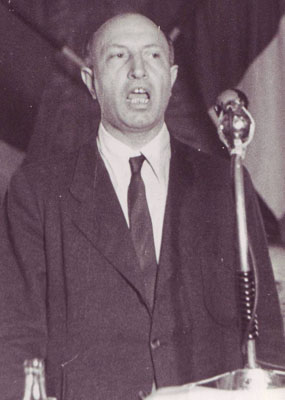| |||||
| Decades: | |||||
|---|---|---|---|---|---|
| See also: | |||||
Events from the year 1936 in Romania. The year saw the Craiova Trial of Romanian Communist Party activists.
| |||||
| Decades: | |||||
|---|---|---|---|---|---|
| See also: | |||||
Events from the year 1936 in Romania. The year saw the Craiova Trial of Romanian Communist Party activists.

Nadia Elena Comăneci Conner is a Romanian retired gymnast and a five-time Olympic gold medalist, all in individual events. In 1976, at the age of 14, Comăneci was the first gymnast to be awarded a perfect score of 10.0 at the Olympic Games. At the same Games she received six more perfect 10s for events en route to winning three gold medals. At the 1980 Summer Olympics in Moscow Comăneci won two more gold medals and achieved two more perfect 10s. During her career Comăneci won nine Olympic medals and four World Artistic Gymnastics Championship medals.

Ana Pauker was a Romanian communist leader and served as the country's foreign minister in the late 1940s and early 1950s. Ana Pauker became the world's first female foreign minister when entering office in December 1947. She was also the unofficial leader of the Romanian Communist Party immediately after World War II.

Lucrețiu Pătrășcanu was a Romanian communist politician and leading member of the Communist Party of Romania (PCR), also noted for his activities as a lawyer, sociologist and economist. For a while, he was a professor at the University of Bucharest. Pătrășcanu rose to a government position before the end of World War II and, after having disagreed with Stalinist tenets on several occasions, eventually came into conflict with the Romanian Communist government of Gheorghe Gheorghiu-Dej. He became a political prisoner and was ultimately executed. Fourteen years after Pătrășcanu's death, Romania's new communist leader, Nicolae Ceaușescu, endorsed his rehabilitation as part of a change in policy.

Iolanda Balaș was a Romanian athlete, an Olympic champion and former world record holder in the high jump. She was the first Romanian woman to win an Olympic gold medal and is considered to have been one of the greatest high jumpers of the twentieth century.

Dimitrie Gusti was a Romanian sociologist, ethnologist, historian, and voluntarist philosopher; a professor at the University of Iaşi and the University of Bucharest, he served as Romania's Minister of Education in 1932–1933. Gusti was elected a member of the Romanian Academy in 1919, and was its president between 1944 and 1946. He was the main contributor to the creation of a new Romanian school of sociology.
Sport in Romania are an important part of the country's culture. Romania has risen to prominence in a number of sporting areas in recent decades. Association football is the most popular sport in Romania, a nation of 20 million. The most successful club is Steaua Bucharest, who were the first Eastern European side to win the European Cup and the European Supercup in 1986. Romania is one of only four national teams from Europe that took part in the first World Cup in 1930. The Romania national football team has taken part in seven FIFA World Cups and had its most successful run during the 1990s, when they reached the quarterfinals of the 1994 FIFA World Cup, losing to Sweden in the penalty shootout. Romania was ranked third by FIFA in 1997.

The 1936 Craiova Trial was a political trial of some members of the Romanian Communist Party, part of the repression of communists in the Kingdom of Romania, judged by a military tribunal in Craiova.

Gheorghe Vlădescu-Răcoasa was a Romanian sociologist, journalist, left-wing politician, and diplomat.
The Romania women's national artistic gymnastics team represents Romania in FIG international competitions.
Events from the year 1938 in Romania. A self-coup and subsequent new constitution make Carol II a royal dictator.
Events from the year 1934 in Romania. The year saw the country sign the Balkan Pact.
Events from the year 1935 in Romania. The year saw the foundation of the Romanian Academy of Sciences.
Events from the year 1958 in Romania. The year saw the end of the Soviet occupation of Romania with the last Soviet troops leaving the country.
Events from the year 1959 in Romania. During the year, the country hosted the first International Mathematical Olympiad.
Events from the year 1960 in Romania. At the 1960 Summer Olympics, Iolanda Balaș wins the first Romanian Olympic gold medal.
Events from the year 1961 in Romania. The year saw the creation of the title of President of the State Council for the de facto head of state. The first office holder was Gheorghe Gheorghiu-Dej, who was already General Secretary of the Romanian Communist Party.
Events from the year 1962 in Romania. The year saw the end of the collectivization of agriculture and increasing de-satellization of Communist Romania as the country last publicly supported the Soviet Union against China and took part is Warsaw Pact army exercises.
Events from the year 1964 in Romania. The year saw increasing separation from Soviet influence.